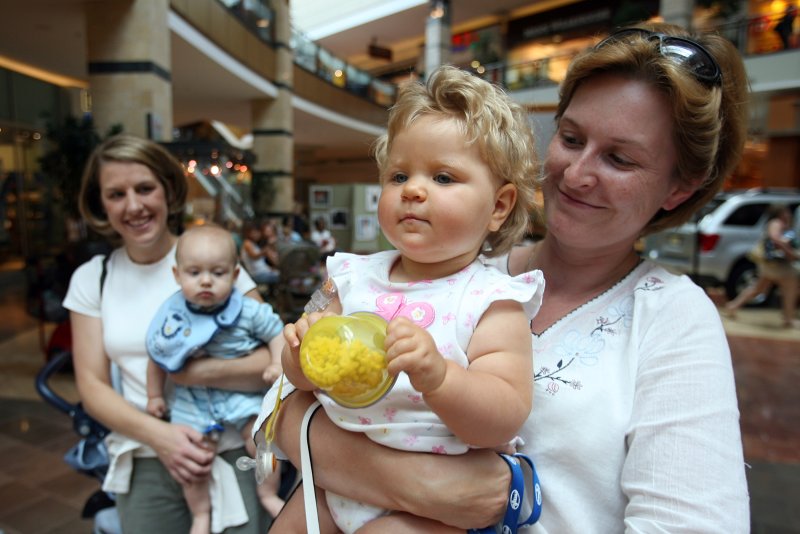Mom Galina Strizheva holds daughter 11-month-old Anna (R) while Jill Aubuchon holds 10-month-old son Chase as they wait in line to have the children photographed during a promotion for Evenflo Baby Products at the Westfield Mall in Des Peres, Mo on June 23, 2006. Evenflo is looking for a new face for its products and is making stops in six cities, taking photographs of children, who will judged by the public on line. (UPI Photo/Bill Greenblatt) |
License Photo
PRINCETON, N.J., Aug. 19 (UPI) -- Parents who want their children to care for them in their old age are best off having daughters, as new research suggests they spend about twice as much time as their male siblings and counterparts do caring for elderly parents.
"Whereas the amount of elderly parent care daughters provide is associated with constraints they face,
such as employment or childcare, sons' caregiving is associated only with the presence or absence of
other helpers, such as sisters or a parent's spouse," explained study author Angelina Grigoryeva, a sociology researcher and doctoral candidate at Princeton University.
Grigoryeva's research is based on information compiled in 2004 as part of a University of Michigan Health and Retirement Study. The longitudinal survey tracks care information on some 26,000 Americans, 50 years and older. Survey participants are interviewed every two years.
Grigoryeva presented her work to attendees at the 109th Annual Meeting of the American Sociological Association in San Francisco on Tuesday.
The research offers a stark chasm in gender roles with respect to elder care. Grigoryeva found that when a daughter has a brother helping care for elder parent, the amount of assistance she provides actually increases. Whereas males are less likely to provide assistance if he has a sister helping out.
For mixed-sex sibling group caring for elder parents, gender was the single most important factor in predicting the amount of assistance each sibling gives.
Grigoryeva suggests the dichotomy isn't just unfair, but unhealthy.
"Numerous empirical studies report negative mental and physical health consequences, including a higher mortality rate, for people who provide care for elderly family members," she said. "In addition, these caregivers often have to balance elder care with employment, potentially resulting in career sacrifices and lower earnings."
The dichotomy, Grigoryeva said, could be "potentially intensifying effects on a series of gender inequalities pertaining to health and economic well-being."















